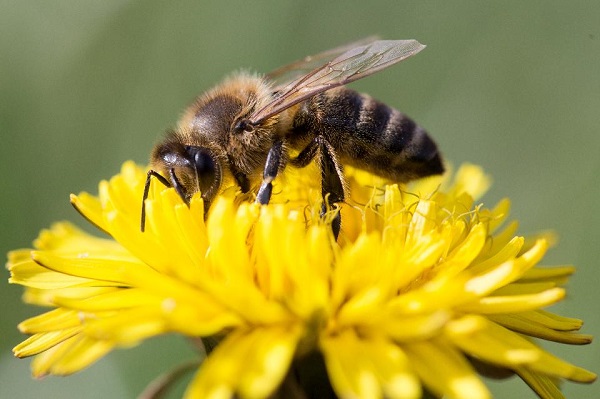With honeybee colony health wavering and researchers trying to find technological ways of pollinating plants in the future, a new study has looked at how the insects do their job and manage to stay clean. According to Science daily.
According to the study, a honeybee can carry up to 30 percent of its body weight in pollen because of the strategic spacing of its nearly three million hairs. The hairs cover the insect’s eyes and entire body in various densities that allow efficient cleaning and transport.
The research found that the gap between each eye hair is approximately the same size as a grain of dandelion pollen, which is typically collected by bees. This keeps the pollen suspended above the eye and allows the forelegs to comb through and collect the particles. The legs are much hairier and the hair is very densely packed — five times denser than the hair on the eyes. This helps the legs collect as much pollen as possible with each swipe. Once the forelegs are sufficiently scrubbed and cleaned by the other legs and the mouth, they return to the eyes and continue the process until the eyes are free of pollen.
The team tethered bees and used high speed cameras to create the first quantified study of the honeybee cleaning process. They watched as the insects were able to remove up to 15,000 particles from their bodies in three minutes.
“Without these hairs and their specialized spacing, it would be almost impossible for a honeybee to stay clean,” said Guillermo Amador, who led the study while pursuing his doctoral degree in mechanical engineering.
This was evident when Amador and the team created a robotic honeybee leg to swipe pollen-covered eyes. When they covered the leg with wax, the smooth, hairless leg gathered four times less pollen.
The high-speed videos also revealed something else.
“Bees have a preprogrammed cleaning routine that doesn’t vary,” said Marguerite Matherne, a Ph.D. “Even if they’re not very dirty in the first place, bees always swipe their eyes a dozen times, six times per leg. The first swipe is the most efficient, and they never have to brush the same area of the eye twice.”
The research also found that pollenkitt, the sticky, viscous fluid found on the surface of pollen grains, is essential. When the fluid was removed from pollen during experiments, bees accumulated half as much.
“If we can start learning from natural pollinators, maybe we can create artificial pollinators to take stress off of bees,” said David Hu, a professor. “Our findings may also be used to create mechanical designs that help keep micro and nanostructured surfaces clean.”
N.H.Kh

